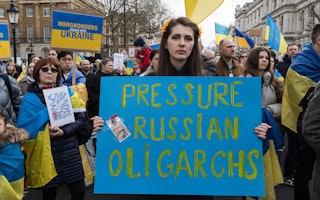Nigeria’s Fuel Sector: Time to Clean up the Dirt
By Oladayo Olaide
Times are hard for Africa’s sleeping giant. With Boko Haram threatening the existence of the nation, the countrywide nine-day protests in January climaxed in the struggle against insensitivity and corruption which have become the defining feature since Nigeria gained independence 51years ago.
The protests followed the January 1 withdrawal of fuel subsidies, which saw a 116% jump in the price of fuel. The removal of subsidies according to Nigeria’s Federal Government was necessary to save revenues, and ultimately drive the government’s transformation agenda. But with public distrust for government at its lowest, fuelled by failed commitments over the last five decades, Nigerians resisted the withdrawal, considered as their only benefit from government. The protest forced price cut-backs after prolonged negotiations. More significantly it forced a probe, seen in live telecasts across the nation, by the House of Representatives into allegations of corruption and mismanagement of the nation’s petroleum sector subsidy regime.
After more than three months, last week the probe committee, headed by House of Representative member Farouk Lawan, laid its final report before the House. The report revealed colossal corruption, theft, collusion, negligence and sale of trust by trust-holders across parastatals in the sector. It identified failure of monitoring and verification, proliferation of marketers, deliberate policies and circumventions of rules that cost huge losses to Nigeria, illegal and criminal deductions across agencies. It indicted the Ministries of Finance, Petroleum Resources and several oversight and regulatory agencies. It also made far-reaching recommendations to cleanse the sector and tighten transparency and accountability. The full house is at present discussing the report.
Nigeria’s oil and gas industry has been a citadel of corruption. The adoption of the Extractive Industry Transparency Initiative (EITI) and various reforms begun under former President Obasanjo were expected to put the spotlight on a sector, which has been for decades (and after becoming the country’s economic mainstay), locked in opacity that benefits a web of corrupt officials - often high-level government - and cronyism. EITI ensures regular audit of the sector, but high-level politics by Nigeria’s elite has discounted the benefits of the frameworks and reforms with several remedial actions still outstanding. Meanwhile the leakages continue to bleed Nigeria of important revenues. The lack of political will to make the required changes continues to sustain the rot in the sector.
The Federal Government has a poor record with probe reports. Several reports have either been killed in Parliament or have not been implemented by the Executive. A clear example is the $16.25 billion power sector probe, which was never implemented whilst Nigerians continue to live in darkness. The National Assembly, comprising the House of Representatives and the Senate, has failed repeatedly to rise above partisan politics in the conduct of its business. The same applies to several probes that have, in most cases, failed to have any impact on corruption and impunity, and are eroding public confidence in government and its institutions. Even though the Assembly and the Executive occasionally disagree, both arms of government act in cahoots to kill important reforms that can check corruption and impunity.
But Nigerians cannot afford to treat the fuel subsidy report likewise. The report confirms the governance challenges and leakages that have dogged the sector. Most of these challenges were identified in the three audits (1999-2004, 2005 and 2006-2008) conducted by Nigeria Extractive Industries Transparency Initiative (NEITI) as well as several studies on the sector, carried out by the federal government and development partners. Still the gaps have never been adequately addressed.
The illiquidity threats facing Nigeria and worsening human development indicators, together with rising violence, create urgency for adoption and implementation of reforms recommended in the subsidy probe report. It will contribute to rebuilding public confidence in the capacity of democracy, and help Federal Government and key democratic institutions deliver justice and economic improvement. The current level of stealing and prebendal corruption in Nigeria is not sustainable and poses serial risks to political and economic stability.
As the Federal Government struggles to contain the Boko Haram mayhem and serial conflicts across parts of Nigeria, it would benefit from targeted assistance to build public confidence. The subsidy report is an important step to test the government’s commitment to confront endemic corruption and impunity. Nigeria and all its friends—multi-lateral and bilateral partners included—should lend their voice to the clarion call for the probe report to be fully implemented.
Until March 2013, Oladayo Olaide was the economic governance program manager for the Open Society Initiative for West Africa (OSIWA).


